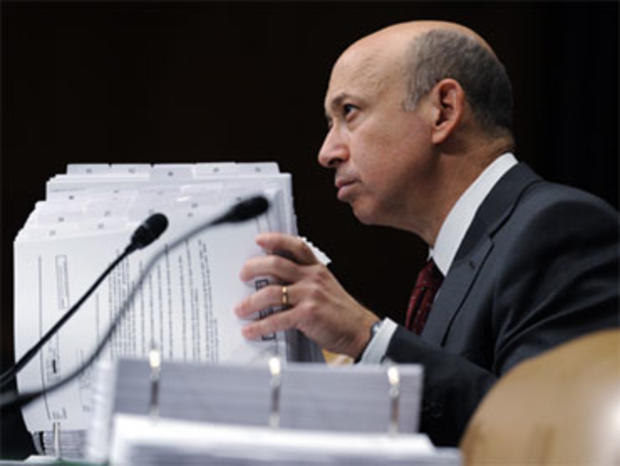Goldman Sachs: Bloodied, Bruised but Still Profitable
Goldman Sachs emerged bloodied and bruised from Tuesday's grueling day - nearly 11 hours - of testimony on Capitol Hill. Lawmakers relentlessly pushed their narrative of the firm's actions leading up to the financial crisis: they were gamblers, unscrupulous street bookies who rigged the market for their own benefit, selling "sh**ty" deals to clients only to bet against those same investments themselves.
And yet.
And yet Wall Street didn't bat an eye at the sight of Goldman executives serving as congressional whipping boys. Goldman's shareholders, arguably the company's true clients, saw the firm's stock price rise around $1 a share, good for a $549 million gain in market value, according to Bloomberg.
CBSNews.com Special Section: Wall Street Under Fire
In fact, among the 79 financial firms on the Standard & Poor's 500, Goldman was the only one that made gains on a day when the market as a whole took a hit, with the Dow Jones industrials falling 213 points.
That underscores just how wide a chasm exists between how Wall Street sees itself as opposed to the rest of the country.
"The cultural realities of what you all do is jarring to most Americans," Sen. Claire McCaskill, D-Mo., told Goldman CEO Lloyd Blankfein at the Senate Permanent Subcommittee on Investigations hearing Tuesday. "This notion of selling a product that you're betting against is hard for people to understand."
In her opening statement, McCaskill compared Goldman's behavior to "raw gambling."
"You are the bookie, you are the house. ... you have less oversight than a pit boss in Las Vegas," she said.
The anger was largely bipartisan, but no one exhibited it more than subcommittee Chairman Sen. Carl Levin, D-Mich., who repeatedly cited an email from a Goldman employee characterizing a security they were peddling as "one sh**ty deal."
When Levin pressed Daniel Sparks, the former head of Goldman's mortgage department, about how the firm could sell securities that they held in such low regard, he got mostly evasive answers and delay tactics.
Goldman's position became clearer as the day went on - they were merely market makers who brought buyers and sellers together. Goldman's opinion of the transaction was irrelevant.
"I don't think our clients care or they should care" what Goldman's position on a security is, Blankfein told the panel.
Blankfein Uses Don't Ask, Don't Tell Defense
In the end, both sides got what they wanted. Congress got the chance to continue the populist drumbeat for reform and beat up on people as unpopular as themselves. But Goldman, no matter how many public relations body blows they absorbed, defended its actions as nothing more than normal Wall Street behavior and survived to do what it does best - make money.
Both sides could go to sleep last night satisfied at a job well done.
More Coverage:
Goldman CEO Blankfein: We'd Can Any Wrongdoers
Goldman Execs Lambasted for "Unbridled Greed"
Inside the Goldman Sachs Hearing Room
Key Moments from Hearing
Levin Repeatedly Cites "Sh**ty Deal" at Goldman Hearing
"Sh**ty Deal": The T-Shirt
